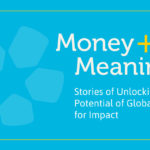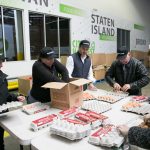If anyone thinks social enterprises spring exclusively from hotbeds of wealth or privilege, they need only look to Rising Tide Capital’s decade-plus record of supporting local entrepreneurs in underserved communities for mountains of evidence to the contrary. The New Jersey-based nonprofit has helped thousands of business owners, most without any higher education, launch or expand organizations.
“When we started,” says co-founder and CEO Alfa Demmellash, “we thought we’d focus on access to financial capital. We realized quickly there’s also social isolation for many of these entrepreneurs.”
So RTC launched its signature program, a network of Community Business Academies, to help its constituents develop their business strategy, business model, and core management skills. “We wanted people to have the language to more effectively communicate their vision, and to help them make sure it aligns with their personal passions and the needs they’re trying to meet,” she says. Each session consists of 80 percent students on scholarships and 20 percent students with more socioeconomic privilege. “There’s an element of providing them all with intentional networking opportunities,” Demmellash says. The popular academies now run in five cities in northern New Jersey, and in partnership with other organizations, are expanding to other regions.
After years of creating a thriving network of entrepreneurs helping their communities, Harvard-educated Demmellash understands the role of business in bringing people together. Read on for her take on the biggest questions facing humanity today and what entrepreneurship has to do with answering them.
Rising Tide Capital At A Glance
Location: Jersey City, NJ
Founded: 2004
Team Members: 28
Impact: 1,770 graduates of the Community Business Academy, with 921 current operational businesses
Recognition: Demmellash was a World Economic Forum 2015 Young Global Leader
Structure: Nonprofit
Mission statement: “Assist struggling individuals and communities to build strong businesses which transform lives, strengthen families, and build sustainable communities.”
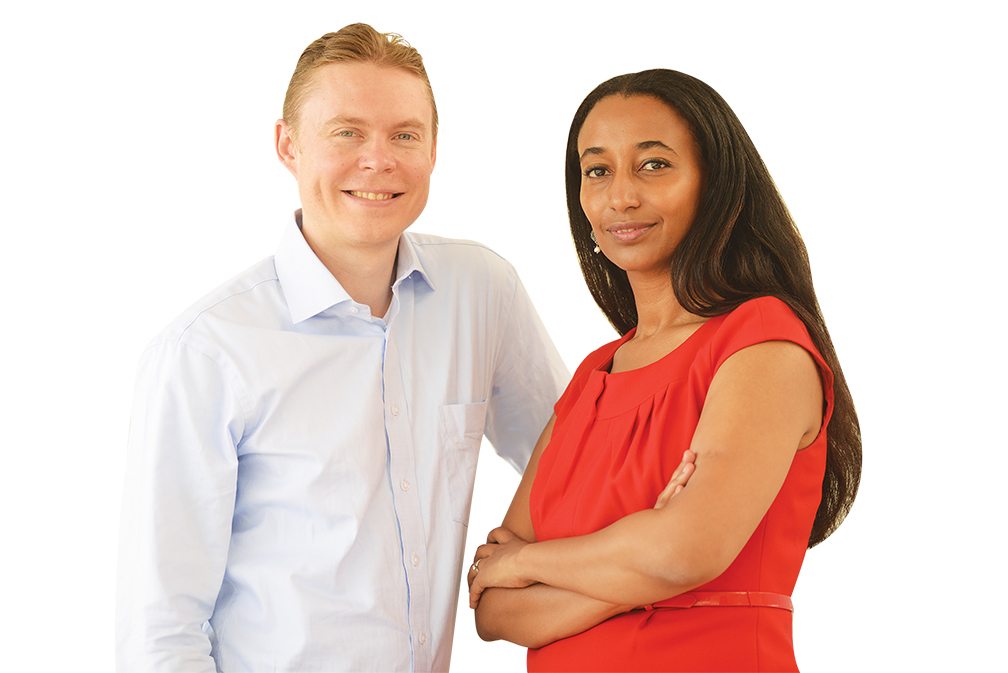
Rising Tide Capital co-founders Alex Forrester (left) and Alfa Demmellash
Alfa Demellash on the Automation of Labor and the Promise of Entrepreneurship
Interview
Tell us about how you ended up doing this. Why is this what’s worth your time?
AD: I was born and raised in Ethiopia. My mom got to the US as a refugee when I was two. She made a promise to reconnect with me and bring me here when she was able to provide for me. That took her about a decade. She started a little business in the evenings sewing gowns that were partially Ethiopian and also adapted to her new home in the West. She sold these gowns as a way of making extra money in addition to waitressing. When I was 12, we reunited and ended up in Boston.
I’d always imagined her in America like a fairy/magical goddess with a castle of her own. And here was my mom working incredibly hard in a small apartment, very concerned about the neighborhood and my education. It gave me an eye for the struggles of people like my mom, even in a place like America. I spent a lot of time volunteering, doing all kinds of programming and work to better connect with and understand the struggles of people in inner-city communities in the US.
My other focus and passion in college was related to why my mom had to run away from Ethiopia: the role of government in conflict and wars. I spent a lot of time studying history, the Rwandan genocide. I went to Rwanda and spent a fair bit of time there, better understanding the role of the marketplace in a place where things fell apart.
You’ve got 3 million people who participated in killing a million-plus people in three months. That’s very intense for a small country. I went there and met people who were still showing up at the marketplace — women who were working so incredibly hard. In so doing, they were re-weaving community. They were creating something out of what one of the taxi drivers described as “living on the edge of derangement.”
I had spent very little time thinking about development or economics, but it hit me like a ton of bricks that the marketplace was where people organized their offerings, where they tested each other’s ethics, and where culture was created. What I was experiencing at that grassroots level was so disconnected from the things I’d read about or would research around IMF policies or the World Bank.
I came back to the States feeling committed to bringing that lens to the community I had the opportunity to connect with here. I ended up in New Jersey because of my wonderful co-founder , who I met in college. We were best friends. He was a postmodern philosophy and theology major, and we would debate about these ideas. There was a lot of ground to cover. He was born and raised in New Jersey, and we came back because of a family health issue.
We spent time going to Camden and Newark and Trenton and Jersey City, finding pockets of incredible people who were innovative, who were asking questions about belonging and opportunity in a broader economy that made all kinds of promises but failed to deliver. These communities were adjacent to incredibly wealthy areas: your Princetons and even downtown Jersey City, where a lot of global corporations have their headquarters. Then you have pockets of deep economic insecurity and poverty. Why? Why is this happening so close?
The more people we met, the more we fell in love with places and people and their aspirations. We kept finding the same things over and over again: people were either starting something or they’d started something they were nurturing, and it was not something they felt confident talking about. The more we brought that out, the more alive people felt, and emboldened, and we just kept going with it.
 After that journey you just told us about, what do you think about the role of business in solving social problems, creating a better world, and creating community?
After that journey you just told us about, what do you think about the role of business in solving social problems, creating a better world, and creating community?
AD: What I’ve decided is that the work of connecting business and economic freedom and aspiration to community and belonging is the most important work of our lifetime. We are at an incredible inflection point as people, as communities, on a global level. That inflection point can be frightening, it can be exciting, and a lot of it is going to be driven by what we decide business is for, by what we decide investment is about. There is tremendous opportunity to do that. What we’re innovating, when it comes to the kinds of business we’re creating, will define what our values are as people.
I feel strongly that the next decade is going to be the most important in terms of shaping where our societies will go. It’s a moment in our evolution. This Fourth Industrial Revolution, which basically is referring to artificial intelligence, biotech, the trends we’re seeing with regard to automation and all the innovations technology is presenting, has huge implications for the way we work, the way we connect with one another, what we choose to build and why, what we invest in.
There are huge disruptive technologies that are just finally seeing the light of day. Go watch the YouTube video “Humans Need Not Apply.” My big aha! was that these are investments that were made, in some cases, decades ago, by tech entrepreneurs and innovators with an expectation of return. So they are like heat-seeking missiles that have already left their bases. Those highly motivated investments are looking for returns and they will get them.
A lot of that return is coming in the form of the displacement of labor. Lots of warehouses are getting automated, lots of everything is getting automated. I don’t know if you’ve walked through an airport recently and seen that instead of having waitresses and waiters, you now have an iPad you can use to order whatever you want. Basically, we’re on a cusp of a massive industrial shift unlike any we’ve ever experienced. Not even the car or the invention of the printing press is on that scale.
Then, all of the world’s most well-educated environmentalists and scientists tell us we have about four decades to really make a difference before we lose the planet . We have one generation to make the pivots we need to make, and business is very much at the heart of it.
Money is something we as a species have created as a way of communicating what we value. I think we need to reconnect to the core reason for why a marketplace exists, for why business exists, for why innovation exists, and keep reaffirming our commitment to human wellbeing and planetary wellbeing — those are directly connected.
Now is the time to get really clear. We are either entering a season of incredible abundance that we can use to address the challenges presented, or we could end up, unintentionally, operating out of a scarcity mind-frame that really doesn’t make sense for the time we’re living in. That scarcity mind-frame is what so much of our business models are based on, and how our products are priced, how our labor is priced. So, we really have to rethink the old models and figure out what we’re going to invest in, what we’re going to use to signal value, and how we’re going to reinforce those things that mean the most to us. Business is a tremendous platform to be able to do that.
How do all these big ideas you were just talking about filter down in practice, day-to-day?
AD: Fundamentally, I believe each of us is infinitely valuable and unique. We must continue to affirm that the individual is not in some kind of utilitarian way to the broader goal. At the same time, the individual emerges out of community. None of us just showed up on the planet. Most of us have emerged out of relationships, out of a community that was created the same way.
Where it gets really interesting is when we, as individuals who are infinitely valuable, get the opportunity to participate in the co-creation of communities and vehicles in the form of businesses, nonprofits, and other kinds of cooperatives or organizations. Those then enable us to collaborate with other infinitely valuable, unique individuals who are bringing all of their knowledge and know-how from whatever community, whatever soil they’ve emerged out of.
Our entrepreneurs are showing us the way. Part of what’s fascinating to me about the Rising Tide model is that when you bring together a community of entrepreneurs who feel like they have shared mores and values, they’re constantly pushing each other to rise to higher and higher levels of value creation.
You have somebody like our entrepreneur Myani Lawson , who starts out saying, “I want high-quality early childhood education in my community; it’s very expensive in these other areas.” So she creates a Montessori school. Three, four years later, what she’s doing now, in partnership with a bunch of alumni of Rising Tide, is creating a movement for Montessori to be present in every public school in Jersey City. She’s using her school to teach others why this model is phenomenal and important, that this could be a way of up-leveling the quality of education throughout the city.
Usually, the entrepreneur starts with their own vision and then I see that vision grow a lot bigger when they’re connected with a lot of other people. They’re saying, “Hey, this should be shared across a much broader community.” I know we throw around the word “ecosystem” a lot, but part of what’s exciting about how we’ve evolved as a species is our unbelievable ability to collaborate and to cooperate.
What I see us at Rising Tide Capital doing is creating the environment where it’s okay to be this way in business, to not just be competitive. You can compete for excellence. You can compete for what you feel is the most creative and beautiful way to do something. But the soil out of which this community of entrepreneurs comes, it’s very much collaboration and constantly practicing expanding our vision to incorporate the visions of others. The entrepreneurs are identifying what their rules of engagement are and creating different kinds of vehicles for the things they value to come to life.
Part of our next step and our challenge at Rising Tide is, how do we get the broader world of investment and capital to shift to meet all of these vehicles where they are? We want to at least help trigger the conversation around what we invest in. I’m not in any way dinging the R&D departments of emerging tech companies; that’s cool. But how do we rebalance some of that to all of this grassroots creativity burgeoning around us and helping us ensure we have a community and a structure that enables creativity by independent and free human beings?
What’s your advice for how to actually create the type of vibrant community where the whole is greater than the sum of the parts?
AD: The first thing I’ll say is that the spaces where you gather people matter. We locate the Community Business Academies in areas that are easy to reach, and are definitively chosen to invite the maximum amount of participation and access — so your church basement in a particular neighborhood. Not the downtown headquarters of a major firm, even if they’d give us the space for free.
We use events very strategically to tie our alumni together, to bring different kinds of people into community with one another in such a way that there is inspiration and practical know-how shared regularly and consistently.
Consistency is key. It’s the reason church works. It’s every Sunday at a certain hour. You never hear, “Oh, the pastor didn’t show up,” or “We’ve switched our location.” People can really anticipate it, show up for it, be in it. There are, right now, 12 Community Business Academies happening simultaneously twice a year, so a total of 24. It runs like clockwork. People know to expect it.
And then experientially showing people how to build something in partnership, how to confront the competitive dynamics that emerge . You can have, say, multiple restaurateurs in a given class, and watch their evolution from walking in and being competitive, like, “Oh, I was thinking of that. Can I share these ideas?” to a place where they feel like, “Actually, my idea’s always going to get even better the more I’m willing to share it.”
How does that transformation happen?
AD: In the 12-week course, our entrepreneurs play large simulations three times. The entire classroom is broken up into different teams where they’re re-creating a local economy. We have volunteers — a lot of our funders — play the role of the banker, the exchange market. We have “life cards” and things that happen to people.
It’s amazing how much we underestimate the role of play in getting adults out of their set mind-frames and giving them an opportunity to inhabit other roles; the dynamics and the momentum and the ways in which your decision-making is impacted by constraints, whether around time or other stressors. A whole bunch of stuff just happens when you bring together people in a marketplace and you give them common vocabulary and rules, and then see what happens — the ways in which they innovate, co-create, compete, solve conflicts, and learn about themselves as well as team dynamics. Those simulations live on in their minds for a very long time.
Then it’s the constant balance of paying attention to someone as an individual, and paying attention to them as they’re inhabiting a role within the business.
And introducing a lot of space — or spaciousness, I should say. Part of the scarcity mindset is that it’s hard to throw off. When you’re first starting out, or if you’re a small business and you actually need many more employees than you have, you’re just constrained for time, no matter who you are. But 70 percent of our entrepreneurs are women, and of those, more than 70 percent are single moms. They’re making $35,000 a year in an area that would require them to make $50,000 a year . But they’re also choosing to be entrepreneurial; it’s more than just the necessity of figuring out how to net $15,000 from whatever goods or services you’re selling. It’s more than growing this business into a vehicle that can take you places, economically and otherwise. There’s also a huge personal determination to be creative, to be more than economic circumstances are prescribing.
There is nothing like the constraints of set economic boundaries. If you’re creative, or if you’re somebody who’s just interested in working outside the boundaries of your zip code, genetics, or inheritances, then this is an environment where you can go, “Yeah. We’re all resource-constrained, for a variety of different reasons. We tap into each other to create an environment that enables us to be just a little bit more creative, a little bit more purposeful in how we direct our energies, our time, whatever resources we feel we have more of than others.”
I see that dynamic playing out over and over again. Our job is to create specific infrastructure; the place, the space, that consistency, the quality of information that is entering, and the reciprocal nature of that information so it’s constantly evolving and we’re learning from external factors but also from the internal creativity and constraints. That’s what’s organic and beautiful about this.
What are the trends you foresee in your industry?
AD: At Rising Tide Capital, we’ve been spending a lot of time figuring out our response to the Fourth Industrial Revolution I mentioned before. Essentially, how do we make meaning of this trend for our audience? How can they begin thinking about what it looks like to have a creative economy, to have culture, to have meaning, and to increase confidence that we can meet this massive challenge that’s coming our way? It’s going to require a lot of consciousness on the part of businesses, investors, public leaders, others like us who believe that business could be used for good.
Then when you add the layers of the populism, nationalism, that is just surfacing — these trends are not disconnected from one another. For me, this is the highest moment of calling and purpose. I started this work having studied the Holocaust and World War II and Rwanda, these moments of great violence and failure to imagine a different way of getting past some of our constraints.
It’s coming again, and there is a particular role we can play as social entrepreneurs, as communicators. That’s what a lot of our entrepreneurs are. They’re communicating what they value. They’re creating things that enable us to see things better, to make better decisions; creating the spaces where we can eat, where we can have more help, where we can focus our energies on educating our young, or playing with our elders, or having rituals.
There’s a huge opportunity to say, “This is a lot of undervalued work and we need to invest in it because this is what it means to be human.” This is what innovation is about. It’s about human wellbeing. And innovation disconnected from human wellbeing is not innovation.
We need to make a connection of the dots in the most accessible language possible to the greatest number of entrepreneurs, business leaders, consumers — and investors in particular. I’ve been out on the road talking to so many people and so many investors, and they say, “It’s funny you mention that, because the top things I get from investment briefs are artificial intelligence, biotech. … It’s all tech, tech, tech.”
The reality is, we need those investors, we need those tech innovators to have a more nuanced view around what innovation actually is. We can only keep society stitched together when we have a sense of community and belonging that is fundamentally about our human wellbeing and our ability to solve any challenge, whether it’s environmental issues, whether it’s violence, or all of the things that we care about.
We are at a moment where, over the next decade, we either solve our challenges and have deeply abundant communities that are sharing and valuing what matters most, or we’re going into significant darkness, with masses in unemployment, depression, war, and violence.
I have two sons, and I’m just like, “We are not handing them this crazy world.” I’m not even convinced we’ll be handing anything over within a generation. I’m going to be running around as a climate refugee or a refugee of some other kind with them. My mom already did that, and I would rather not have us be refugees again. With my education, with my networks, with all of my creativity and passion, I would rather not doom my kids to a life of being a refugee. I’m pretty on about it.
Ten years is like ten days in this context. It’s taken us 14 years to build this nonprofit, and it’s going to take us another decade to get all of our lessons learned and our tools into the hands of many local social entrepreneurs and innovators so they can create their ecosystem and we can all learn together and create the communities we want to see.
Meanwhile, I feel like there’s this other gigantic plane heading our way and we have an opportunity to respond with, “Hey, it’s coming, and let’s get creative. Let’s get busy building community, building belonging, and investing in the right things. But let’s not ignore it, because we’ll be swept away by it.”
What’s giving you hope?
AD: The trends I’m talking about, the assumption is, “You can’t talk about this stuff with the guy who runs the laundromat or the woman who’s creating an auto shop or the restaurateur or the notary or the health specialist or the educator.” But I came back from the World Economic Forum in Davos in January determined to have the conversation.
And every time I talk with one of our entrepreneurs or community partners about this, they are fully there and acknowledge it. I’m connecting the dots, but they’re saying, “Oh, yeah. I left my job because that automated. I never thought of it in those terms. Here’s the way I changed, and I’m now living the best possible life I could have imagined. This one is actually more automation-proof than other things I was doing.”
I’m having conversations like that. I’m rarely having: “What do we do now? This sounds terrible, and terrifying, and I’m depressed.” That’s not what’s happening, which makes me believe that social entrepreneurs, business owners, when they have access to meaning-making, to information, and to community, are, humbly speaking, our most important resource.
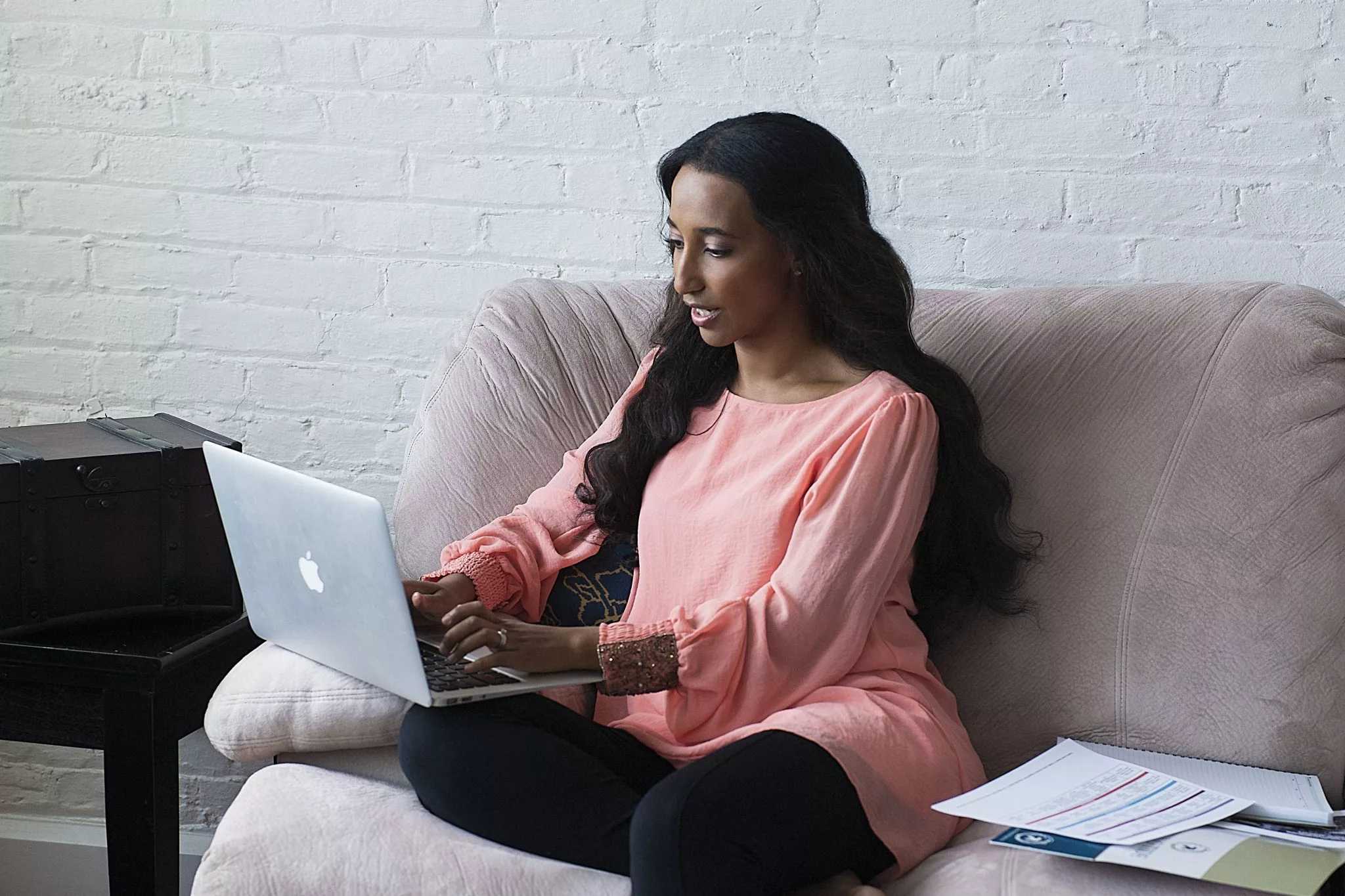
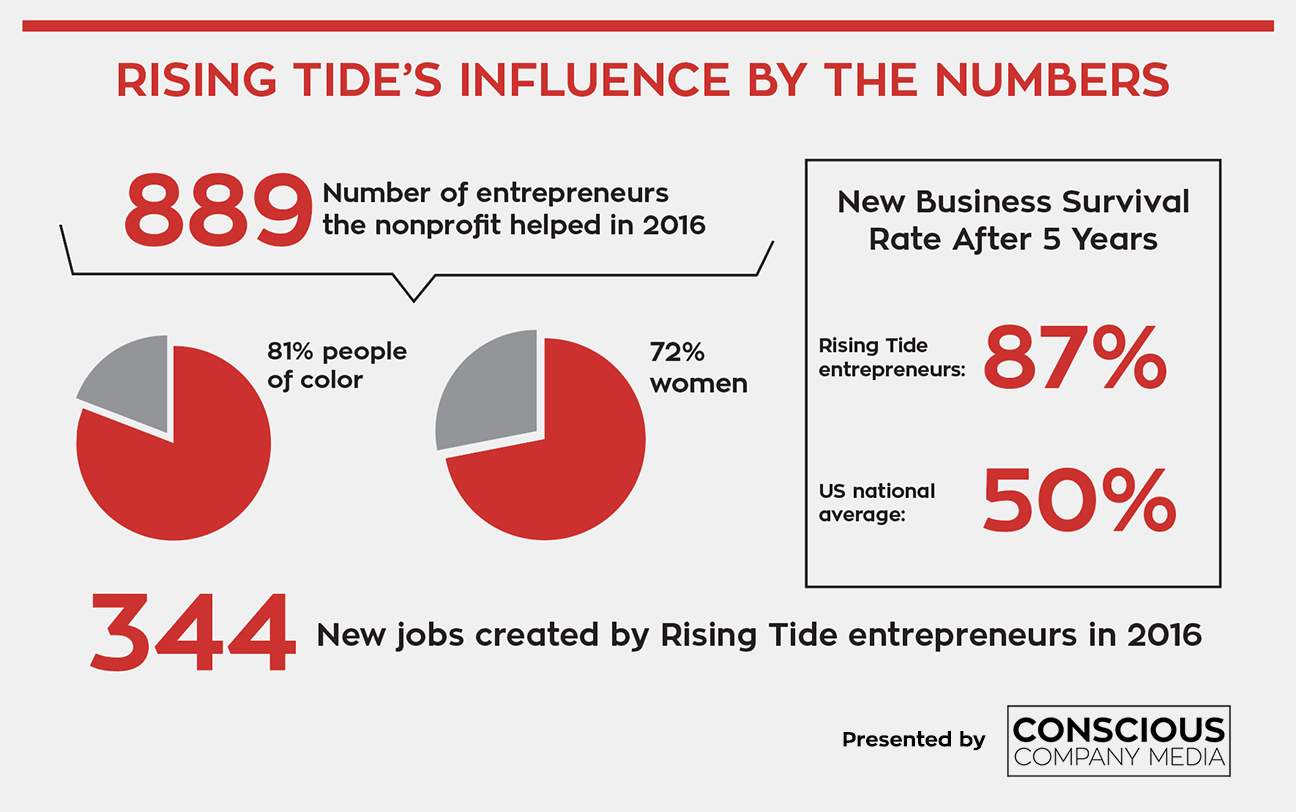 After that journey you just told us about, what do you think about the role of business in solving social problems, creating a better world, and creating community?
After that journey you just told us about, what do you think about the role of business in solving social problems, creating a better world, and creating community? 